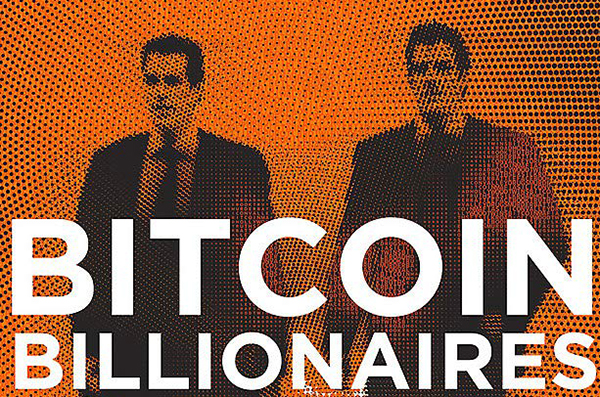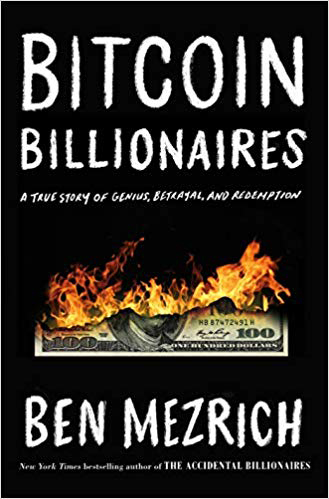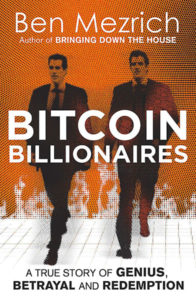Home »

Bitcoin Billionaires makes one think of the world we live in
Book Review
By Derryll White
 Mezrich, Ben (2019). Bitcoin Billionaires: A True Story of Genius, Betrayal, and Redemption.
Mezrich, Ben (2019). Bitcoin Billionaires: A True Story of Genius, Betrayal, and Redemption.
“Gravity doesn’t work because you believe in Isaac Newton.” – Charlie Schrem
I read this book because I am truly puzzled and ignorant about just what ‘bitcoin’ is. Early into the story as Ben Mezrich writes about the link between Facebook founder Mark Zuckerberg and the twin Olympic rowers Tyler and Cameron Winklevoss, I realized why I have refused to participate in Facebook. Zuckerberg is shown to be a despicable human being with the morals of an alley cat. And Facebook is exposed as a platform that has shifted the Internet into the invasion of privacy and commerce at all levels. So I learned why I was hesitant to consign my private life to the online juggernaut with Mezrich exposing how Zuckerberg mined Facebook and Harvard data for his own purposes.
Essentially the Bitcoin Network eliminates the need in financial transactions for trusted, central parties such as the Federal Reserve, Visa or Mastercard. It is a peer-to-peer network. “Miners” solve the math puzzles generated by bitcoin transactions and add that transaction to the global register, being rewarded with newly minted bitcoins from the finite 21 million bitcoins originally created.
Satoshi Nakamoto created Bitcoin on October 31, 2008, with the release of his white paper titled: Bitcoin: A Peer-to-Peer Electronic Cash System, and then releasing the first version of Bitcoin software into the wild three months later. The first Bitcoin block, block 0 – the “Genesis Block” – was verified by Satoshi on January 3, 2009. Satoshi Nakamoto disappeared soon after, never to be heard from again. The name appears to be a Japanese pseudonym meaning “thinking clearly inside the foundation.”
What becomes increasingly clear to the reader as the Bitcoin story unrolls is how incredibly artificial the whole concept of money and banking is. Most people, in their day-to-day world, do not think about the collapse of the monetary system. In 2013 the nation of Cyprus closed all its banks due to national economic collapse and imposed huge taxes on all accounts held in Cyprus. Normal people did not have access to any currency for some time, and then saw that much of their savings had vanished due to government decree. It doesn’t take much of an intellectual leap to realize this could also happen here.
‘Bitcoin Billionaires’ is a book that makes the reader think about the world we live in, how rapidly it is changing, and what each of our places in it might be. I have a lot of thinking to do, and inevitably some changing is required, but I am really glad that I have read this book.
****
BITCOIN – “‘Bitcoin’ with a capital B refers to the protocol, in other words, the entire Bitcoin Network,” Voorhees said, his more measured tone a stark contrast to Charlie’s verbal sprint. While ‘bitcoin’ with a lowercase b refers to the digital asset that travels along the Bitcoin Network.”
VALUE – “The same properties that make gold valuable, make bitcoin valuable.”
LIMINAL STATE – “…it’s a thing. I think it was from Anthropology 101. Society is made up of structures. That’s how we cope with all of the things we can’t control – life, death, illness, love, the fucking weather. We make structures and we live in them. But when we cross out of these structures, we enter a weird, strange, odd sate.”
“A liminal state,” Courtney replied.
FACEBOOK – A business model built on the commodification of private lives….
BITCOIN – Moreover, the technology behind Bitcoin has only barely begun to infiltrate the financial, technological and online worlds. The technology that makes Bitcoin work – the blockchain and crypto private keys – has the potential to decentralize not just money but also data in a way that could “give the internet back to the people” – freeing user information from the siloed monopolies of Facebook, Google, Amazon, etc. The irony is that Bitcoin and its hashes may very well do what Facebook so spectacularly failed to do – protect its users’ data from hackers, misuse, and overarching authority, and allow a form of online communication that is entirely and truly free.
 – Derryll White once wrote books but now chooses to read and write about them. When not reading he writes history for the web at www.basininstitute.org.
– Derryll White once wrote books but now chooses to read and write about them. When not reading he writes history for the web at www.basininstitute.org.








